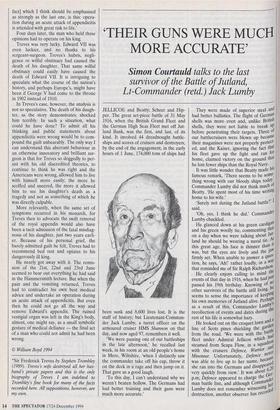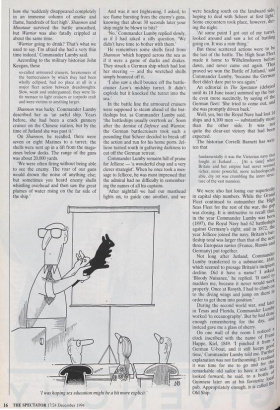`THEIR GUNS WERE MUCH MORE ACCURATE'
Simon Courtauld talks to the last
survivor of the Battle of Jutland, Lt-Commander (retd.) Jack Lumby
JELLICOE and Beatty; Scheer and Hip- per. The great set-piece battle of 31 May 1916, when the British Grand Fleet and the German High Seas Fleet met off Jut- land Bank, was the first, and last, of its kind. It involved 44 dreadnought battle- ships and scores of cruisers and destroyers; by the end of the engagement, in the early hours of 1 June, 174,000 tons of ships had been sunk and 8,600 lives lost. It is the stuff of history; but Lieutenant-Comman- der Jack Lumby, a turret officer on the armoured cruiser HMS Shannon on that day, and now aged 97, remembers it well.
`We were passing one of our battleships in the late afternoon,' he recalled last week, in his room at an old people's home in Mere, Wiltshire, 'when I distinctly saw the commander take off his cap, throw it on the deck in a rage and then jump on it. That gave us a good laugh.
`To this day, I can't understand why we weren't beaten hollow. The Germans had had better training and their guns were much more accurate.'
They were made of superior steel and had better ballistics. The flight of German shells was more even and, unlike British shells, they were not liable to break uP before penetrating their targets. Three of our battlecruisers were blown up because their magazines were not properly protect- ed, and the Kaiser, ignoring the fact that his fleet gave up the fight and ran for home, claimed victory on the ground that he lost fewer ships than the Royal Navy.
It was little wonder that Beatty made his famous remark, 'There seems to be some thing wrong with our bloody ships today. Commander Lumby did not think much of Beatty. 'He spent most of his time writing home to his wife.' `Surely not during the Jutland battle?' I said.
`Oh, yes, I think he did.' Commander Lumby chuckled. He glanced down at his green cardigan and his green woolly tie, commenting that on a day when we were talking about Jut' land he should be wearing a naval tie. Ai this great age, his face is thinner than it was, but the eyes are lively and the jay/ firmly set. When unable to answer a clues. tion, he says, rather loudly, in a 01 that reminded me of Sir Ralph Richardson. He clearly enjoys calling to mind the events of that day in 1916, when he had just passed his 19th birthday. Knowing of 112, other survivors of the battle still living, he seems to sense the importance of keePill his own memories of Jutland alive. Perhaps as a result of this, Commander LunibY recollection of events and dates during the rest of his life is somewhat hazy. He looked out on the croquet lawn and ai line of Scots pines shielding the garden ,e from the road. 'We were with the battid fleet under Admiral Jellicoe which Pa steamed from Scapa Flow, in a sqtra°1°,4n with the cruisers Defence, Warrior all Minotaur. Unfortunately, Defence never was able to live up to her name, because she ran into the Germans and disapPear% very quickly from view.' It was about 6.2; p.m; Defence appeared to charge the del man battle line, and although Common Lumby does not remember witnessing dilater destruction, another observer has recorder how she `suddenly disappeared completely in an immense column of smoke and flame, hundreds of feet high'. Shannon and Minotaur survived the battle unscathed, but Warrior was also fatally crippled at about the same time.
`Warrior going to drink? That's what we used to say. I'm afraid she had a very thin time indeed,' Commander Lumby said.
According to the military historian John Keegan, these
so-called armoured cruisers, forerunners of the battlecruisers by which they had been wholly eclipsed, had no place at all in a major fleet action between dreadnoughts. Slow, weak and undergunned, they were lit- tle menace to light cruisers or torpedo craft and were victims to anything larger.
Shannon was lucky. Commander Lumby described her as 'an awful ship. Years before, she had been a crack gunnery cruiser on the Chinese station, but by the time of Jutland she was past it.'
On Shannon, he recalled, there were seven or eight Marines to a turret; the shells were sent up in a lift from the maga- zines below decks. The range of the guns was about 20,000 yards.
`We were often firing without being able to see the enemy. The roar of our guns would drown the noise of anything else; but sometimes you heard enemy shells whistling overhead and then saw the great plumes of water rising on the far side of the ship.' And was it not frightening, I asked, to see flame bursting from the enemy's guns, knowing that about 30 seconds later your ship might be blown to bits?
`No,' Commander Lumby replied slowly, as if I had asked a silly question. `We didn't have time to bother with them.'
He remembers some shells fired from Shannon `which hopped across the sea as if it were a game of ducks and drakes. They struck a German ship which had lost her steering — and the wretched shells simply bounced off it.
`I also saw a shell bounce off the battle- cruiser Lion's midship turret. It didn't explode but it knocked the turret into the sea.'
In the battle line the armoured cruisers were supposed to steam ahead of the bat- tleships but, as Commander Lumby said, `the battleships usually overtook us'. Soon after the demise of Defence and Wanior, the German battlecruisers took such a pounding that Scheer decided to break off the action and run for his home ports. Jel- licoe turned south in gathering darkness to cut off the German retreat.
Commander Lumby remains full of praise for Jellicoe — 'a wonderful chap and a very clever strategist'. When he once took a mes- sage to Jellicoe, he was most impressed that the admiral had no difficulty in remember- ing the names of all his captains.
`After nightfall we had our masthead lights on, to guide one another, and we was hoping sex education might be a bit more explicit.' were heading south on the landward side; hoping to deal with Scheer at first light.' Some encounters took place, however, dur- ing the night.
`At some point I got out of my turret, looked around and saw a lot of battling going on. It was a rum thing.' But those scattered actions were to be the last of the battle. The High Seas Fleet made it home to Wilhelmshaven before dawn, and never came out again. 'That proved we won the Battle of Jutland,' said Commander Lumby, 'because the German fleet didn't dare put to sea again.'
An editorial in The Spectator (delayed until its 10 June issue) summed up the bat- tle even more succinctly, by saying of the German fleet: 'She tried to come out, and she was promptly driven back.' Well, yes, but the Royal Navy had lost 14 ships and 6,100 men — substantially More than the other side. It was not quite the clear-cut victory that had been expected. The historian Correlli Barnett has writ- ten that
fundamentally it was the Victorian navy that fought at Jutland . .. [At a time] when Britain and her empire had never seemed richer, more powerful, more technologicallY able, dry rot was crumbling the inner struc- ture of the vast mansion.
We were also fast losing our superioritY in capital ship numbers. While the Grand Fleet continued to outnumber the sigh Seas Fleet for the rest of the war, the gap was closing. It is instructive to recall that, in the year Commander Lumby was born (1897), the Royal Navy had 62 battleships against Germany's eight; and in 1872, the year Jellicoe joined the navy, Britain's bat- tleship total was larger than that of the nest three European navies (France, Russia and Germany) put together. Not long after Jutland, Commander Lumby transferred to a submarine, .1149' which seemed to presage Britain's incipient decline. Did it have a name? I asked. `Bloody Nuisance,' he replied. 'It used to madden me, because it never would work properly. Once at Rosyth, I had to climb on to the diving wings and jump on them in order to get them into position.' During the second world war, and later in Texas and Florida, Commander Lumby worked 'in oceanography'. But he had done enough remembering for the day, all instead gave me a glass of sherry. On one wall of the room I noticed a clock inscribed with the name of Franz Happe, Kiel, 1849. 'I pinched it from cia German U-boat, and it still keeps g°,° time,' Commander Lumby told me. Further d explanation was not forthcoming; I realised it was time for me to go and for tide remarkable old sailor to have a rest. °f looked forward, he said, to a bottle 01 Guinness later on at his favouritelo.,e pub. Appropriately enough, it is called I" Old Ship.











































































































 Previous page
Previous page